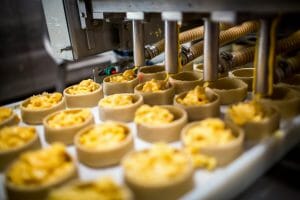Scottish food manufacturer Strathmore Foods has successfully enhanced its health and safety, process productivity, and sustainability performance after an audit of its Forfar plant identified a series of potential improvements.
Like many food manufacturers, Strathmore Foods counts water, energy, and fuel costs among the highest of its overheads. The family-operated firm was keen to improve the energy efficiency of its heat transfer processes and maximise savings, in order to remain competitive and sustain its future for generations to come.
 Following a plant audit with Spirax Sarco, Strathmore Foods made the decision to upgrade its current steam/water mixing units with a more suitable alternative.
Following a plant audit with Spirax Sarco, Strathmore Foods made the decision to upgrade its current steam/water mixing units with a more suitable alternative.
The seven mixing units were replaced with a single, more compact EasiHeat™ packaged plate heat exchanger. A packaged plate heat exchanger captures and reuses heat, which may otherwise be wasted. This reduces the amount of steam required, which, in turn, cuts fuel demand and the associated CO₂ emissions.
The heating system is now able to deliver a constant supply of instantaneous hot water at a stable temperature through a single unit. It also has the ability to cope with greater demand. This has enabled clean-in-place (CIP) and wash-down to be completed in a more productive way, while maintenance time and costs have been cut dramatically.
The benefits of the new system have helped Strathmore Foods to cope better with periods of high and low capacity, allowing plant operators to tailor the output required on-demand. The net result is a more sustainable future for the business and opportunity for expansion in the future.
“At the early planning stages, we were quite simply looking at ways to improve our wash-down process, but we have gained a lot more than we bargained for,” says Douglas Nisbet, Operations Director at Strathmore Foods. “Our primary aim was to improve process efficiency – not only have we achieved that but we’ve also secured a sustainable future for the business as this device will allow us room to grow.
“As you can imagine, a single unit is much easier to manage than it was before, therefore maintenance time and costs have been cut dramatically, as has downtime.”
Douglas adds: “Our new system is part of an existing service agreement we have with Spirax, which has made our annual servicing procedure a fairly effortless one. All of this helps us to keep the system running at optimum efficiency all year round, which is our main objective.”
Dave Bird, Divisional Sales Manager at Spirax Sarco, added: “Food manufacturers are notoriously large consumers of water and energy, so fuel costs will always represent a high proportion of their overheads. We aim to support our customers and identify opportunities for improving process efficiency and energy savings.”
To find out how an audit could future-proof the potential of your steam system, please visit: sxscom.uk/SteamSystemAudits.





